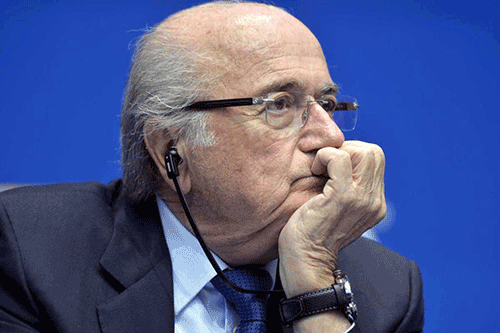After 17 years of holding sway as the boss of the apex global soccer governing body, FIFA, Sepp Blatter eventually threw in the towel in a rather controversial circumstance. Thus came to an end, perhaps, the most controversy dotted era in the history of world football.

Blatter quit his plum FIFA job amidst severe bribery and corruption allegations, just a few days after he had won the election that guaranteed him a fifth tenure in office that would have seen him directing the body’s affairs till 2020. Announcing his resignation, the 79-year-old Blatter, declared: “My mandate does not appear to be supported by everybody.”
FIFA, under Blatter’s leadership has been engrossed in several bribery and corruption scandals which have seriously undermined the image of the soccer ruling body. Several of its officials, at one time or the other, have been indicted and punished over numerous sordid corruption matters.
Famous Nigerian sport administrator, Amos Adamu, once received a three-year ban and 10,000 Swiss franc (£6,341) fine from FIFA’s ethics committee after being found guilty of breaching bribery rules. His fellow executive committee member, Reynald Temarii, was suspended for a year and fined 5,000 Swiss francs (£3,170) for breaching rules on loyalty and confidentiality. The bans follow a media expose which alleged the officials had asked for cash in return for World Cup votes.
A former executive committee member of FIFA told a United States judge in 2013 that he took bribes in connection with the 1998 and 2010 World Cups. Similarly, South Africa is currently being investigated for allegedly offering $10 million bribe in order to grab the hosting right of the 2010 World Cup which it hosted.
According to ailing former FIFA executive committee member, Chuck Blazer, he and others accepted bribes in conjunction with the selection of South Africa as the host nation for the 2010 World Cup. Blazer, a former top official of football in North and Central America and the Caribbean also revealed that he received bribes sometimes in 1992 to distort the process that determined the host of the 1998 World Cup. His guilty plea was kept secret until May 27, perhaps to allow him testify before a United States grand jury against some of the nine FIFA officials and five others recently indicted in the United States in an investigation of bribery and corruption in the global soccer body.
Under Blatter’s watch, FIFA and corruption have become intimate and inseparable companions. In the days leading to the recent election that gave Blatter a fifth tenure in office, a mind-blowing corruption allegation, which saw seven officials of the global soccer body arrested and charged for racketeering, hi-tech fraud and money laundering, seriously rocked the very foundation of the soccer body. In-fact, the decision of Blatter to finally take a bow is not unconnected with the latest scandal. Though, he had consistently denied allegations of corruption being leveled against him, Blatter agreed to step down because, according to him, scandal-tainted FIFA needs “profound reconstruction” and that he had “thoroughly reconsidered” his presidency since his reelection.
However, a special congress that would usher in Blatter’s successor cannot be held until between December 2015 and March 2016, according to Domenico Scala, chairman of FIFA’s independent audit and compliance committee. According to soccer pundits, with the stepping aside of Blatter, the next real battle would be for the very soul of FIFA. It should be stressed that Europe and the United States of America have been quite vocal in their condemnation of the corruption ridden Blatter’s FIFA. They have been in the forefront of a vociferous and persistent call for reforms and transparency in FIFA. Now that Blatter is almost getting out of the way, Europe and the United States would certainly want to have a huge say in who succeeds the embattled Blatter. On the other hand, being a shrewd politician and administrator, it is not unlikely that Blatter would also be scheming to install one of his loyal cronies to succeed him.
Whoever takes over from Blatter, the truth, however, is that FIFA needs a profound overhaul. Lots of things need to be changed in the way things are done in FIFA. For instance, there is a need to change the way the World Cup bid is decided so as to eliminate tendencies that promote sordid dealings. Also, the sit tight inclinations of FIFA and its affiliated bodies’ leadership should be discouraged. Jean-Joao Havelange, Blatter’s predecessor served as the 7th President of FIFA, from 1974 to 1998; a period of twenty four years.
His successor, Blatter had been in the saddle from 1998 till date. In Africa, Issa Hayyatou, the Cameroonian former athlete, has been the president of the Confederation of African Football, CAF, since 1988. By implication, he has been directing the affairs of the soccer body for 27 years and there are no signs of him quitting yet. There is, therefore, an urgent need to reform the FIFA’s statues, especially those that have to do with the number of years that a FIFA President and those of its affiliated bodies could spend in office. It should not be a norm that they could be in the saddle for as long as they so desire.
Without doubt, football has become a money spinning sport across the globe. The organisation and management of football in Europe, for instance, is a multi-million dollars venture with all the teams running other sports related businesses. Indeed, all sorts of professionals-doctors, physiotherapists, psychologists, grass men, scouts, etc-are employed by the various teams in their drive for soccer glory. Therefore, football, in Europe, has gone beyond the mere recreational activity that it is in Nigeria. As a result of the excellent manner it is managed in Europe, youths across the continent have found in football a means through which they could use their talents to escape poverty. Players such as Wayne Rooney, Cesc Fabrigas, Christiano Ronaldo, Lionel Messi among others-thanks to football-have become multi-millionaires before they clocked the age of 21.
In order to preserve the beautiful game and ensure that it continues to enjoy wide followership across the globe in addition to recording greater financial successes, it is crucial that issues relating to its management are effectively addressed so that the running of the beautiful game would not be left in the hands of charlatans. Of what essence is a beautiful game without beautiful administrators?
• Ogunbiyi is of the Features Unit, Ministry of Information & Strategy, Alausa-Ikeja.












